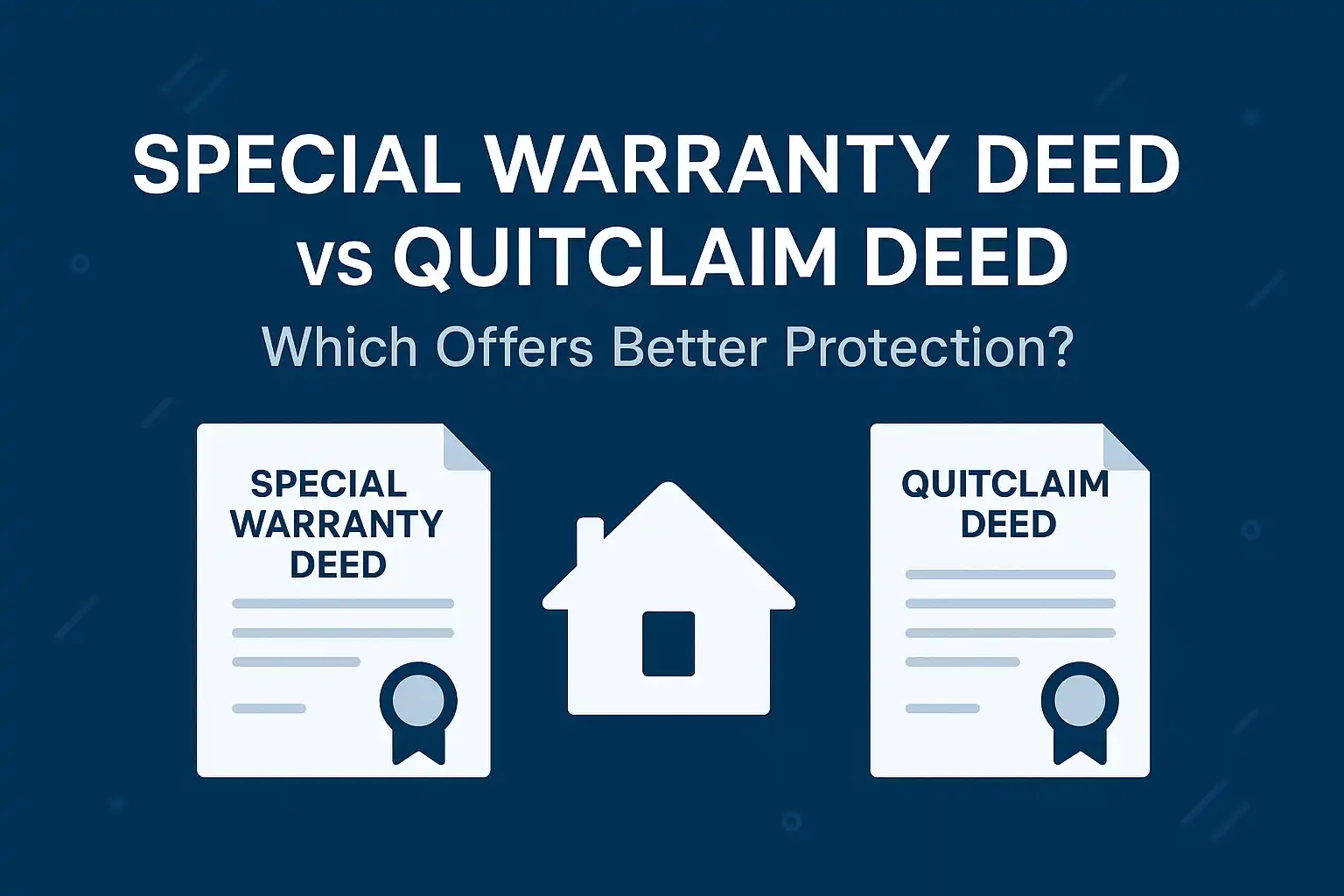
When transferring real estate, property owners often overlook special warranty deeds as a middle-ground option between the minimal protection of quitclaim deeds and the comprehensive coverage of general warranty deeds. Understanding the distinctions between special warranty deeds and quitclaim deeds is crucial for making informed decisions about property transfers, risk management, and long-term protection strategies.
Quick Protection Comparison
| Protection Level | Quitclaim Deed | Special Warranty Deed |
|---|---|---|
| Warranties Provided | None | Limited to grantor’s ownership period |
| Title Protection | No guarantees | Warrants against grantor’s actions only |
| Legal Recourse | None against grantor | Legal remedies for warranty breaches |
| Risk to Grantee | Highest | Moderate |
| Cost | Lowest | Moderate |
| Title Insurance Need | Essential | Recommended |
| Commercial Use | Limited | Common in business transactions |
Understanding Special Warranty Deeds: The Middle Ground
Definition and Legal Framework
A special warranty deed, also known as a limited warranty deed in some jurisdictions, provides specific warranties from the grantor covering only the period during which they owned the property. Unlike general warranty deeds that warrant the entire chain of title, special warranty deeds limit the grantor’s liability to defects that arose during their ownership.
According to the American Bar Association’s Real Property Guidelines, special warranty deeds represent a compromise between comprehensive protection and limited liability that serves many commercial and investment transactions effectively.
Key Warranties in Special Warranty Deeds
Covenant of Seisin: The grantor warrants they own the property and have the right to convey it at the time of transfer.
Covenant Against Encumbrances: The grantor warrants they have not created any undisclosed liens, mortgages, or other encumbrances during their ownership period.
Covenant of Quiet Enjoyment: The grantor warrants the grantee will not be disturbed in their ownership by claims arising from the grantor’s period of ownership.
Covenant of Further Assurance: The grantor agrees to execute additional documents necessary to perfect the grantee’s title for issues arising during the grantor’s ownership.
Time-Limited Protection Scope
Ownership Period Coverage: Protection extends only to the time period when the grantor actually owned the property.
Prior Owner Exclusions: No protection against title defects, liens, or encumbrances created by previous owners in the chain of title.
Future Claims: Limited protection against future claims that relate to actions taken during the grantor’s ownership period.
Disclosed Exceptions: Express exclusions for known liens, easements, or restrictions that are specifically mentioned in the deed.
Quitclaim Deeds Revisited: Minimal Protection Analysis
Legal Characteristics
Quitclaim deeds transfer whatever interest the grantor possesses without any warranties or guarantees about the quality, extent, or even existence of that interest. The grantor makes no promises about having clear title or the authority to transfer the property.
Risk Profile for Grantees
Unknown Title Status: No assurance that the grantor actually owns any interest in the property being transferred.
Existing Encumbrances: No protection against liens, mortgages, judgments, or other claims that may affect the property.
Fraudulent Transfers: No recourse if the grantor lacked authority to transfer the property or obtained title through fraudulent means.
Future Marketability: Properties with quitclaim deed histories may face challenges in future sales or financing situations.
Appropriate Use Cases
Family Transfers: Situations where trust exists between parties and comprehensive warranties aren’t necessary.
Title Cleanup: Removing potential clouds on title where parties understand existing limitations.
Estate Planning: Transfers between family members or into trusts where warranty protection isn’t required.
Divorce Settlements: Court-ordered transfers between divorcing spouses where other legal protections exist.
According to Uniform Commercial Code guidelines, the choice of deed type should align with the level of protection required and the relationship between the transferring parties.
Comparative Risk Analysis: Protection Levels Explained
Special Warranty Deed Risk Management
Limited Time Coverage: Provides meaningful protection against defects arising during the grantor’s ownership, which often represents the period of greatest known risk.
Legal Recourse Available: Grantees have specific legal remedies against grantors who breach the limited warranties provided.
Enhanced Marketability: Properties with special warranty deed transfers are generally more acceptable to lenders and subsequent buyers.
Reduced Title Insurance Costs: Some title companies offer reduced premiums due to the grantor’s warranties providing additional protection.
Quitclaim Deed Risk Exposure
Complete Risk Transfer: All title risks transfer to the grantee with no protection against any defects, regardless of when they arose.
No Legal Recourse: Grantees have no warranty-based claims against grantors even if title problems are discovered later.
Financing Challenges: Lenders may require additional title work or higher insurance coverage for properties with quitclaim deed histories.
Resale Complications: Future buyers may be hesitant to purchase properties with extensive quitclaim deed transfer histories.
Residual Risks for Both Deed Types
Prior Chain Issues: Neither deed type provides complete protection against title defects created by owners prior to the grantor’s ownership period.
Government Actions: Neither protects against future government actions such as eminent domain, tax foreclosures, or regulatory changes.
Recording Errors: Both deed types are subject to risks from recording errors, forged documents, or other public record defects.
Unknown Heirs: Neither provides complete protection against claims by unknown heirs or missing parties from previous transfers.
Financial and Commercial Implications
Transaction Cost Comparisons
Document Preparation: Special warranty deeds require more complex legal language and preparation, resulting in higher attorney or title company fees.
Title Insurance Premiums: Special warranty deeds may qualify for reduced title insurance rates due to the grantor’s limited warranties.
Due Diligence Requirements: Both deed types typically require comprehensive title examination, though special warranty deeds may reduce some examination scope.
Professional Fees: Special warranty deeds often justify higher professional fees due to increased complexity and warranty analysis.
Lending and Financing Impact
Mortgage Approval: Lenders generally prefer properties with special warranty deed transfers over quitclaim deed transfers due to enhanced protection.
Commercial Financing: Commercial lenders often require special warranty deeds or better for investment property financing.
Refinancing Considerations: Properties with special warranty deed histories typically face fewer obstacles in refinancing situations.
Interest Rate Impact: Some lenders may offer slightly better rates for properties with enhanced deed protection due to reduced risk.
Investment Property Considerations
Portfolio Management: Special warranty deeds provide better protection for real estate investment portfolios and subsequent asset management.
Exit Strategy Planning: Properties with special warranty deed transfers often command better resale prices and attract more qualified buyers.
Risk Assessment: Investment analysis should factor in the enhanced protection and marketability benefits of special warranty deeds.
Due Diligence Standards: Commercial investors typically prefer special warranty deeds as part of comprehensive risk management strategies.
State-Specific Usage Patterns and Requirements
Eastern and Southern States
Common Usage: Special warranty deeds are standard practice in many eastern and southern states for commercial transactions.
Statutory Framework: States like Virginia, North Carolina, and Georgia have well-developed statutory frameworks governing special warranty deed protections.
Title Standards: Local bar associations and title companies have established standards for special warranty deed usage and interpretation.
Recording Requirements: Specific formatting and language requirements vary by state but generally follow similar patterns.
Commercial Transaction Preferences
Business-to-Business Transfers: Special warranty deeds are often preferred in commercial transactions where parties want some protection without unlimited liability.
Investment Sales: Real estate investment transactions frequently use special warranty deeds to balance protection and liability concerns.
Developer Transfers: Property developers often use special warranty deeds when selling to investors or commercial buyers.
Entity Restructuring: Business entity changes and restructuring often utilize special warranty deeds for appropriate protection levels.
Regional Variations
Texas Practice: Special warranty deeds are commonly used in Texas commercial transactions as an alternative to general warranty deeds.
Florida Usage: Florida real estate practice includes special warranty deeds for specific transaction types, particularly commercial deals.
California Alternatives: While California primarily uses grant deeds, special warranty deeds serve similar functions in appropriate situations.
New York Commercial: New York commercial practice often employs special warranty deeds for investment property transfers.
According to the National Association of Realtors, deed selection should align with transaction type, party relationships, and local market practices to optimize protection and marketability.
Industry Best Practices and Professional Standards
Real Estate Professional Recommendations
Transaction Analysis: Real estate professionals evaluate the relationship between parties, property values, and risk tolerance to recommend appropriate deed types.
Market Standards: Understanding local market preferences and standard practices helps guide appropriate deed selection for optimal outcomes.
Client Education: Professional agents educate clients about the differences in protection levels and associated costs of various deed types.
Risk Communication: Clear communication about deed-related risks helps clients make informed decisions about their specific situations.
Legal Professional Guidelines
Liability Management: Attorneys often recommend special warranty deeds to balance client protection with reasonable limitation of grantor liability.
Documentation Standards: Proper preparation of special warranty deeds requires attention to specific warranty language and statutory requirements.
Title Examination: Legal professionals coordinate deed selection with comprehensive title examination to identify and address potential issues.
Client Counseling: Lawyers provide detailed explanation of warranty implications and long-term consequences of deed selection.
Title Industry Standards
Underwriting Guidelines: Title companies have specific underwriting standards for different deed types that affect insurance availability and pricing.
Risk Assessment: Professional title examination evaluates existing title conditions to inform appropriate deed selection and insurance recommendations.
Industry Coordination: Title professionals work with attorneys and real estate agents to ensure proper deed preparation and recording procedures.
Claims Experience: Title company claims experience with different deed types informs recommendations and insurance pricing strategies.
Strategic Decision-Making Framework
Choose Special Warranty Deeds When:
Commercial Transactions: Business-to-business transfers where parties want meaningful protection without unlimited warranty exposure.
Investment Properties: Real estate investments where enhanced protection improves marketability and financing options.
Developer Sales: Property developers selling to investors or commercial buyers who need protection against developer actions.
Entity Transfers: Business entity restructuring where moderate protection is appropriate without comprehensive warranty liability.
Financing Requirements: Transactions where lender preferences favor enhanced deed protection over quitclaim transfers.
Choose Quitclaim Deeds When:
Family Relationships: Transfers between trusted family members where comprehensive warranties aren’t necessary.
Title Cleanup: Removing specific clouds on title where parties understand existing limitations and risks.
Estate Planning: Trust transfers and estate planning scenarios where warranty protection isn’t required.
Divorce Situations: Court-ordered transfers where other legal protections exist and warranty coverage isn’t beneficial.
Cost Sensitivity: Situations where minimizing transaction costs is paramount and parties accept higher risk levels.
Hybrid Considerations
Mixed Relationships: Some transactions involve both business and personal elements requiring careful analysis of appropriate protection levels.
Partial Interests: Transfers of partial ownership interests may benefit from special warranty protection even in family contexts.
Future Planning: Consider long-term implications for estate planning, business succession, and potential future transfers.
Market Conditions: Local market preferences and standard practices should influence deed selection for optimal outcomes.
Professional Service Integration and Recommendations
When to Consult Real Estate Attorneys
Complex Commercial Transactions: High-value commercial deals benefit from legal analysis of appropriate warranty levels and risk allocation.
Liability Concerns: Situations where grantors are concerned about unlimited warranty exposure require legal guidance on protection strategies.
Multi-Party Transactions: Complex ownership structures and multiple parties require careful legal coordination of deed types and protections.
Dispute Prevention: Legal consultation helps prevent future disputes through appropriate deed selection and clear documentation.
Title Company Expertise
Risk Assessment: Professional title examination helps determine appropriate deed types based on existing title conditions and potential issues.
Insurance Recommendations: Title companies provide guidance on insurance requirements and cost implications for different deed types.
Market Knowledge: Title professionals understand local preferences and standard practices that affect deed selection and acceptability.
Closing Coordination: Professional closing services ensure proper deed preparation, execution, and recording for chosen deed types.
Financial and Tax Planning Integration
Investment Analysis: Financial advisors help evaluate the long-term implications of deed selection on investment returns and risk management.
Tax Considerations: Tax professionals advise on the implications of different deed types for income tax, gift tax, and estate planning purposes.
Estate Planning Coordination: Estate planning attorneys coordinate deed selection with broader wealth management and succession planning strategies.
According to legal experts at Deeds.com, “Special warranty deeds provide a practical middle ground that often serves commercial transactions effectively while limiting grantor liability to reasonable levels.”
Common Misconceptions and Professional Clarifications
Special Warranty Deed Myths
Myth: “Special warranty deeds provide complete title protection.” Reality: Protection is limited to defects arising during the grantor’s ownership period only.
Myth: “Special warranty deeds eliminate the need for title insurance.” Reality: Title insurance remains important to protect against risks not covered by the limited warranties.
Myth: “Special warranty deeds are only for commercial transactions.” Reality: While common in commercial deals, special warranty deeds can be appropriate for various transaction types.
Quitclaim Deed Misunderstandings
Myth: “Quitclaim deeds are invalid or inferior to other deed types.” Reality: Quitclaim deeds are legally valid and appropriate for many specific situations despite offering no warranties.
Myth: “You can’t sell property that was acquired by quitclaim deed.” Reality: Properties acquired by quitclaim deed can be resold, though additional title work may be required.
Myth: “Quitclaim deeds automatically mean there are title problems.” Reality: Quitclaim deeds are often used for routine family transfers and estate planning without indicating title issues.
Advanced Considerations for Sophisticated Transactions
Commercial Real Estate Applications
Portfolio Acquisitions: Large-scale commercial acquisitions often use special warranty deeds to balance protection with practical liability limitations.
REIT Transactions: Real Estate Investment Trusts frequently employ special warranty deeds for asset acquisitions and dispositions.
Development Projects: Property development transactions may use special warranty deeds to allocate risk appropriately between developers and investors.
Institutional Investments: Institutional real estate investments often require special warranty deed protection as part of fiduciary responsibilities.
Estate Planning Integration
Trust Funding: Special warranty deeds may be appropriate when funding trusts with commercial or investment property requiring enhanced protection.
Succession Planning: Business succession planning may utilize special warranty deeds to transfer real estate while limiting liability exposure.
Generation-Skipping Strategies: Multi-generational transfers may benefit from special warranty deed protection for younger beneficiaries.
Tax-Motivated Transfers: Gift and estate tax planning may coordinate with deed selection to optimize both tax and legal protection outcomes.
International and Multi-Jurisdictional Considerations
Cross-Border Transactions: International real estate transactions may require special warranty deeds to meet foreign investor protection requirements.
Multi-State Holdings: Investors with properties in multiple states must consider varying deed type preferences and legal frameworks.
Foreign Entity Ownership: Foreign corporations and entities may prefer special warranty deed protection due to limited familiarity with U.S. title systems.
Future Trends and Market Evolution
Technology Impact on Deed Selection
Digital Recording: Electronic recording systems are making special warranty deeds more accessible and cost-effective to prepare and record.
Blockchain Applications: Emerging blockchain title systems may affect the relative importance of deed warranties versus technological verification.
Automated Due Diligence: Technology-enhanced title examination may reduce the relative importance of deed type in risk assessment.
Market Standardization Trends
Industry Consolidation: Consolidation in the title insurance industry may lead to more standardized approaches to deed type preferences and pricing.
Legal Standardization: Uniform state laws and model legislation may reduce variations in special warranty deed frameworks across jurisdictions.
Professional Standards: Continuing evolution of professional standards may affect recommendations for deed type selection in various scenarios.
Conclusion and Strategic Recommendations
The choice between special warranty deeds and quitclaim deeds involves balancing protection levels, cost considerations, liability exposure, and transaction-specific factors. Special warranty deeds offer meaningful middle-ground protection that serves many commercial and investment scenarios effectively, while quitclaim deeds remain appropriate for family transfers and specific title cleanup situations.
Key Decision Factors:
- Commercial vs. family relationships between parties
- Property values and economic stakes involved
- Liability tolerance of grantors and protection needs of grantees
- Financing requirements and lender preferences
- Long-term marketability and investment considerations
Professional Recommendations:
- Commercial transactions: Special warranty deeds typically provide appropriate protection without unlimited liability
- Investment properties: Enhanced deed protection improves financing options and resale potential
- Family transfers: Quitclaim deeds often sufficient with proper title insurance and professional guidance
- Complex situations: Legal consultation ensures optimal deed selection and risk management
Risk Management Strategy: Regardless of deed type selected, comprehensive title insurance provides essential protection against unforeseen title defects. The deed selection should complement comprehensive due diligence and professional guidance rather than substitute for proper risk assessment.
Implementation Guidelines:
- Analyze transaction specifics including party relationships, property values, and risk tolerance
- Research applicable state laws and local market practices for deed type preferences
- Consult qualified professionals for complex transactions or significant property values
- Coordinate with financing requirements and lender preferences for optimal outcomes
- Plan for future implications including resale potential and estate planning considerations
Understanding the protection spectrum from quitclaim deeds through special warranty deeds to general warranty deeds enables property owners and professionals to select appropriate instruments that balance protection, cost, and liability considerations effectively. Special warranty deeds fill an important gap in the deed protection spectrum that serves many modern real estate transactions well.
The enhanced protection of special warranty deeds often justifies their additional complexity and cost in commercial contexts, while quitclaim deeds remain valuable tools for appropriate family and title cleanup situations. Professional guidance ensures optimal deed selection that serves both immediate transaction needs and long-term strategic objectives.
This analysis provides general information about special warranty deeds and quitclaim deeds based on common legal frameworks and market practices. Specific state laws, local customs, and individual circumstances may require different approaches. Always consult with qualified legal and real estate professionals for guidance specific to your transaction and jurisdiction.


Leave a Reply